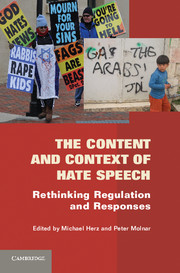Book contents
- Frontmatter
- Contents
- Contributors
- Foreword: Hate Speech and the Coming Death of the International Standard before It Was Born (Complaints of a Watchdog)
- Foreword: Hate Speech and Common Sense
- Acknowledgments
- Introduction
- Part I Overviews
- 1 Interview with Robert Post
- 2 Is There a Case for Banning Hate Speech?
- 3 Hate Speech
- 4 Interview with Kenan Malik
- 5 Hate Speech and the Demos
- 6 On American Hate Speech Law
- Part II Refinements and Distinctions
- Part III Equality and Fear
- Part IV International Law
- Index
- References
2 - Is There a Case for Banning Hate Speech?
Published online by Cambridge University Press: 05 June 2012
- Frontmatter
- Contents
- Contributors
- Foreword: Hate Speech and the Coming Death of the International Standard before It Was Born (Complaints of a Watchdog)
- Foreword: Hate Speech and Common Sense
- Acknowledgments
- Introduction
- Part I Overviews
- 1 Interview with Robert Post
- 2 Is There a Case for Banning Hate Speech?
- 3 Hate Speech
- 4 Interview with Kenan Malik
- 5 Hate Speech and the Demos
- 6 On American Hate Speech Law
- Part II Refinements and Distinctions
- Part III Equality and Fear
- Part IV International Law
- Index
- References
Summary
During the past few decades, there has been an almost universal trend toward banning so-called hate speech directed at individuals or groups on the basis of their race, ethnicity, nationality, or religion. The prohibited forms of expression vary from country to country, but the basic thrust is the same. Britain bans abusive, insulting, and threatening speech; Denmark and Canada prohibit speech that is insulting and degrading; and India and Israel ban speech that incites racial and religious hatred or is likely to stir up hostility between groups. In the Netherlands, it is a criminal offense to express publicly views insulting to groups of persons. Australia prohibits speech that offends, insults, humiliates, or intimidates individuals or groups, and some of its states have laws banning racial vilification. Germany goes further, banning speech that violates the dignity of an individual, implies that he or she is an inferior being, or maliciously degrades or defames a group.
Many of these countries claim to be guided by or find support in the International Covenant on Civil and Political Rights, particularly Article 20, which requires a ban on “any advocacy of national, racial or religious hatred that constitutes incitement to discrimination.” Some of them are also signatories to the International Convention on the Elimination of All Forms of Racial Discrimination, Article 4 of which requires parties to “condemn all propaganda or organisations based on theories of racial superiority and incitement to racial discrimination and acts of violence” and to eradicate “all dissemination of ideas based on racial superiority or hatred, incitement to racial discrimination, as well as all acts of violence or incitement to such acts against any race or group of persons of another colour or ethnic origin, and also the provision of any assistance to racist activities, including the financing thereof.” Although the United States restricts some speech on the grounds that it threatens national security, constitutes obscenity or child pornography, presents a danger of an imminent breach of peace, or is patently offensive and directed at a captive audience or used in a workplace, it is, with the recent exception of Hungary, the only country to resist the trend to ban hate speech. Even here, however, such a broad interpretation of the First Amendment of its Constitution is of relatively recent origin, going back no further than the 1960s, and several writers have argued that the country needs to reconsider its position.
Information
- Type
- Chapter
- Information
- The Content and Context of Hate SpeechRethinking Regulation and Responses, pp. 37 - 56Publisher: Cambridge University PressPrint publication year: 2012
References
Accessibility standard: Unknown
Why this information is here
This section outlines the accessibility features of this content - including support for screen readers, full keyboard navigation and high-contrast display options. This may not be relevant for you.Accessibility Information
- 64
- Cited by
